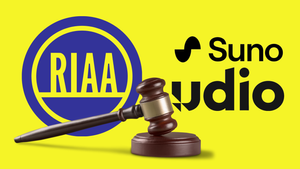The CEO of music AI business Suno has said that the record companies have “reverted to their old lawyer-led playbook” by suing his company for copyright infringement. In response, record industry trade group the RIAA insists that Suno “continues to dodge the basic question: what sound recordings have they illegally copied?”
Suno AI CEO Mikey Shulman was commenting on lawsuits filed yesterday against his company and rival AI business Udio by the Recording Industry Association Of America on behalf of its members. The RIAA-member labels accuse Suno and Udio of training their generative AI models with copyright protected music without obtaining licences, which constitutes copyright infringement.
“Suno’s mission is to make it possible for everyone to make music”, Shulman says. “Our technology is transformative; it is designed to generate completely new outputs, not to memorise and regurgitate pre-existing content. That is why we don’t allow user prompts that reference specific artists”.
The company “would have been happy to explain this to the corporate record labels that filed this lawsuit - and in fact, we tried to do so”, Shulman adds. But, “instead of entertaining a good faith discussion, they’ve reverted to their old lawyer-led playbook”, a clear reference to the lawsuits the record industry filed in the early days of digital music, from Napster onwards.
However, in its response, the RIAA notes that - despite all the lawsuits it was involved in during the early days of digital music - the “winners of the streaming era worked cooperatively with artists and rightsholders to properly license music”, while “the losers did exactly what Suno and Udio are doing now”.
By insisting that Suno does not “memorise and regurgitate pre-existing content”, Shulman is possibly trying to deflect any allegations that tracks generated by his company’s AI are basically derivative works of the music used to train the model, and therefore each new track infringes the copyright in the old tracks.
Some of the other lawsuits filed by copyright owners against AI companies have made that allegation. Whether or not that is a valid claim depends on your definition of ‘derivative work’.
In the context of music, that might be more complex, because with music it is more common for human creators to combine multiple existing works to create a new derivative work. You could argue that the same is happening with generative AI, just at a significant scale. Although AI companies would counter that this claim is a misunderstanding of how their technologies work.
That said, the core allegation in most of the AI copyright cases is that the AI company ingested lots of copyright-protected works as part of the training process, and that is in itself copyright infringement. The copyright status of any AI-generated works is then irrelevant, and the main legal debate moves onto whether copying existing works as part of AI training constitutes fair use under American law.
In terms of this dispute, the RIAA actually alleges that, despite Shulman’s statement, Suno does sometimes generate “outputs with strong resemblance to the copyrighted recordings”.
However, in the RIAA lawsuit, the labels who take issue with Suno add that they are not - for the moment, at least - claiming that the “outputs themselves infringe the copyrighted recordings”. Instead, they say, the outputs are the evidence that “Suno has copied specific copyrighted recordings into its training data to build its service”.
In its statement responding to Shulman, the trade group adds, “In an apparent attempt to deceive working artists, rightsholders, and the media about its technology, Suno refuses to address the fact that its service has literally been caught on tape - as part of the evidence in this case - doing what Mr Shulman says his company doesn't do: memorising and regurgitating the art made by humans”.

